
'One Nation, One Election' : Modi govt clears plan for simultaneous polls
Union I&B minister Ashwani Vaishnaw says no timeline has yet been decided to roll out the simultaneous polls

The Union Cabinet on Wednesday (September 18) approved the 'One Nation, One Election' initiative, which seeks to hold simultaneous Lok Sabha and Assembly elections, along with urban body and panchayat polls. The Bill will be presented in the Winter Session of Parliament.
The big question, however, is: Is the plan feasible? We have a ready reckoner for you.
This decision is based on the recommendations of a committee chaired by former President Ram Nath Kovind.
Union I&B minister Ashwani Vaishnaw says no timeline has yet been decided to roll out the simultaneous polls.
"Further nationwide consultations will be held on specific proposals for synchronizing the elections. The date will be fixed after consultation process is completed and necessary amendments to the Constitution are made. The rollout, whenever it happens, will be done in 2 phases - first, for synchronization of Lok Sabha polls with elections to all state assemblies and second, after 100 days of phase 1, to synchronize polls of all local bodies across the country, Vaishnaw said.
Completely unacceptable, says Congress
Congress president Mallikarjun Kharge has said simultaneous polls are "completely unacceptable because they are not practical" in the current political situation.
Prime Minister Narendra Modi had made a strong pitch for “One Nation, One Election” in his first Independence Day speech of his third term last month, saying frequent polls were creating hurdles in the country's progress. He has often spoken about bringing the country out of the endless cycle of elections, which leads to a wastage of resources and money.
The basic idea of “One Nation, One Election” is to conduct Lok Sabha as well as state assembly polls simultaneously. Currently, Lok Sabha and state Assemblies have varying election schedules depending on their dissolution or other factors.
However, Opposition parties led by the Congress have resented the idea, saying it is not pragmatic to implement on ground. Besides, those opposing the government move have come out with their own set of arguments.
The Kovind-led high-level committee’s recommendations on simultaneous elections
Elections have been held simultaneously between 1951 and 1967.
Law Commission: 170th report (1999): One election to Lok Sabha and all Legislative Assemblies in five years.
Parliamentary Committee 79th Report (2015): suggest methods for simultaneous elections in two phases.
The panel extensively consulted a broad spectrum of stakeholders including political parties and experts.
Extensive feedback has shown there is widespread support for simultaneous elections in the country.
What the government said on “recommendations and way forward”
Implement in two phases.
In first phase: conduct Lok Sabha and Assembly elections simultaneously.
In second phase: Conduct local body elections (panchayat and municipalities) within 100 days of general elections.
Common electoral roll for all elections.
Will initiate detailed discussions throughout the country.
Constitute an implementation group.
Read the high-level committee's 322-page full report on 'One Nation, One Election'

